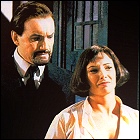 The TARDIS has been set for a new course by Kamelion, who is attempting to go to the source of a distress signal which is overriding his every function. The Doctor manages to wrest control of the ship from Kamelion and lands the TARDIS on Earth to investigate. While the Doctor finds little of importance, other than a freshly uncovered batch of artifacts from an archaeological expedition, Turlough discovers the signal’s source and immobilizes the TARDIS to avoid going there. Turlough also spots a drowning swimmer on the TARDIS scanner. He rescues the girl, discovering that she has stolen the oddest of the artifacts that the Doctor saw earlier. When the Doctor returns, the TARDIS again takes off without his control, and apparently with a new passenger on board. The mystery of the new passengers unravels quickly, as does the mystery of who has been controlling Kamelion. But why is Turlough so keen to avoid a colony from his own planet – a colony of outcasts of which he may be a member?
The TARDIS has been set for a new course by Kamelion, who is attempting to go to the source of a distress signal which is overriding his every function. The Doctor manages to wrest control of the ship from Kamelion and lands the TARDIS on Earth to investigate. While the Doctor finds little of importance, other than a freshly uncovered batch of artifacts from an archaeological expedition, Turlough discovers the signal’s source and immobilizes the TARDIS to avoid going there. Turlough also spots a drowning swimmer on the TARDIS scanner. He rescues the girl, discovering that she has stolen the oddest of the artifacts that the Doctor saw earlier. When the Doctor returns, the TARDIS again takes off without his control, and apparently with a new passenger on board. The mystery of the new passengers unravels quickly, as does the mystery of who has been controlling Kamelion. But why is Turlough so keen to avoid a colony from his own planet – a colony of outcasts of which he may be a member?
written by Peter Grimwade
directed by Fiona Cumming
music by Peter HowellCast: Peter Davison (The Doctor), Janet Fielding (Tegan), Mark Strickson (Turlough), Anthony Ainley (The Master), Peter Wyngarde (Timanov), Barbara Shelley (Sorasta), Gerald Flood (voice of Kamelion), James Bate (Amyand), Dallas Adams (Professor Foster), Edward Highmore (Malkon), Jonathan Caplan (Roskal), John Alkin (Lomand), Michael Bangerter (Curt), Simon Sutton (Lookout), Max Arthur (Zuko), Ray Knight (Trion)
Broadcast from February 23 through March 2, 1984
LogBook entry & review by Earl Green
Review: Though the rapid-fire changes in Kamelion’s appearance and attitude are a bit confusing, there is a lot to like about this four-parter, whose main goal was to give Turlough (Mark Strickson) a send-off as enigmatic as his introduction. And in that regard, Planet Of Fire is a success, since we learn more about where Turlough is from, and how he was stranded on Earth in Mawdryn Undead, but not a great deal more about his culture. (Tony Attwood, the writer of the horribly-contrived Blake’s 7 novel Afterlife, wrote an original novel, “Turlough and the Earthlink Dilemma”, focusing on Turlough and his home planet of Trion. “Earthlink Dilemma” was the first of the short-lived “Companions of Doctor Who” series of spinoff novels, and was also easily the worst of the bunch.) Despite the fact that Turlough’s entrance and exit are riddled with questions, I think I can savor the mystery much more than I can handle anyone’s attempts to resolve it. The Turlough in this story was once again the X-factor, literally sabotaging the TARDIS rather than allow it to take him back to his own people. After the running-around-scared-and-getting-captured of the  previous two stories, it’s quite a relief to see the ambiguous Turlough of old once more. His farewell scene was actually more emotional than I would have expected. It would be three years and two Doctors later before the series would be graced with such a complex and intriguing companion character.
previous two stories, it’s quite a relief to see the ambiguous Turlough of old once more. His farewell scene was actually more emotional than I would have expected. It would be three years and two Doctors later before the series would be graced with such a complex and intriguing companion character.
Planet Of Fire‘s other primary goal was to introduce Nicola Bryant as the new companion, Perpugilliam “Peri” Brown. There’s no denying that Nicola Bryant is a very attractive actress, but Planet Of Fire and Caves Of Androzani offered her two of her best outings in the show before she was relegated to well-endowed-damsel-in-distress status for much of the Colin Baker era. I’m reminded of Adric’s very short reign as Tom Baker’s only companion – Peri played off of the fifth Doctor much better than the sixth, and she showed a great deal of independence in the short span of these two stories.
Kamelion is also given the boot in this story, which barely even shows up as a blip on my radar. Kamelion was always a non-character to me. Anthony Ainley reprises the Master for his final full confrontation with the fifth Doctor, and though his fate is a bit nebulous – does he or does he not burn to death in the garish blue glow of superimposed natural gas flames? – he’s much more menacing than he’s been in a long time, and his motives make a hell of a lot more sense than that did in, say, Time-Flight.
